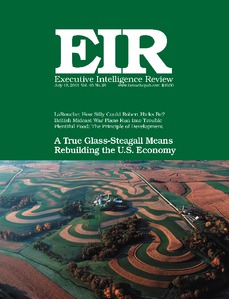Plentiful Food: The Principle of Development
by Marcia Merry Baker
We continue our coverage of the June 29 Schiller Institute conference in San Francisco, with four presentations that address the crises in food production and water resources, beginning with EIR Food and Agriculture specialist Marcia Merry Baker.
Keeping the Farmer on the Land
by Frank Endres
Endres, a California farmer, is a leader in the national farm movement. His presentation, using many images, is being shown to farmers throughout the U.S.
Glass-Steagall, NAWAPA—The Fight in Canada
by Robert Hux
Hux, a member of the LaRouche-associated Committee for the Republic of Canada, spoke about the urgency of expanding water resources on the American continent through development of NAWAPA.
Mankind’s Occupation of the Biosphere
by Omar Pensado Díaz
Dr. Pensado, a biologist and former director of the Center for Advanced Studies at the Popular Autonomous University of Veracruz (Mexico), is an outspoken critic of the unscientific theories of anthropogenic global warming.
National
A True Glass-Steagall Means Rebuilding the U.S. Economy
by Lyndon H. LaRouche, Jr.
A dialogue, excerpted from LaRouche’s July 12 webcast, on the fight for Glass-Steagall, and the crucial role to be played by the LaRouche Policy Committee.
New Glass-Steagall Bill Stirs Debate
by Jeffrey Steinberg
A second Glass-Steagall bill, introduced into the Senate by Elizabeth Warren et al. (S. 1282) joins Tom Harkin’s S. 985; and in the House, the Kaptur-Jones bill, H.R. 129, now has 70 sponsors.
International
British Permanent War Plans for Mideast Run into Trouble
by Nancy Spannaus
Egyptian President Morsi’s decision to sever relations with the Assad government in Syria, without first consulting with his Defense Minister and Supreme Commander, Gen. Abdul Fatah al-Sisi, tipped the balance in the Egyptian military’s decision to oust Morsi from power.
U.K. Parliamentarians Challenge Queen’s Perpetual War Policy
by Carl Osgood
The British Parliament is in revolt against the government’s plan to supply arms to the Syrian rebels.
Germany Must Become Sovereign; We Need a Civil Rights Movement!
by Helga Zepp-LaRouche
Mrs. LaRouche assesses the impact in Germany of NSA spying, exposed by whistleblower Edward Snowden, comparing the massive surveillance to that practiced by the Nazi Gestapo and the East German Stasi.
Impoverished Mali Can Become a Breadbasket for the Sahel
by Lawrence K. Freeman
A first-hand report on the author’s recent visit to Mali, on the eve of July 28 Presidential elections.
Feature
A Study of Percussive Intercourse: How Silly Could Robert Hicks Be?
by Lyndon H. LaRouche, Jr.
In his commentary on a recent New York Times op-ed, LaRouche identifies the source of the author’s confusion about the Civil War, in his failure to take into account “the actual history of the Aaron Burr legacy,” and that of the traitor Burr’s protégé Andrew Jackson.
Editorial
Lift Our Eyes to the Stars



